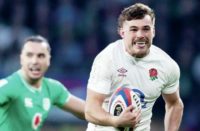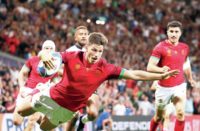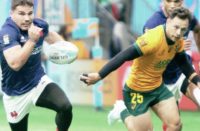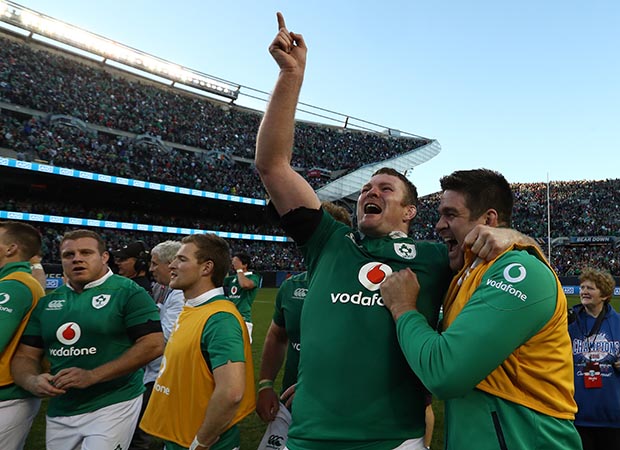 Suddenly the biggest match in Irish Rugby history is upon us – well so it seems. New Zealand at home just two weeks after their historic win over the All Blacks in Chicago, what a delicious prospect that is and what a priceless opportunity for Ireland to strike again while the iron is hot.
Suddenly the biggest match in Irish Rugby history is upon us – well so it seems. New Zealand at home just two weeks after their historic win over the All Blacks in Chicago, what a delicious prospect that is and what a priceless opportunity for Ireland to strike again while the iron is hot.
The two sides have never met twice before in the autumn so a series win is also up for grabs if Ireland can lower New Zealand's colours again or even draw. And the timing and logistics could hardly be better. Victories of the magnitude of that 40-29 win over the world champions must be celebrated and absorbed into the psyche and a return meeting this weekend might well have been seven days too early for Ireland.
Instead Ireland have been enjoying a little downtime with their alcohol ban being lifted for the cheery flight home on Monday while there was an afternoon off for most of the front-line players yesterday against Canada. Meanwhile both Sean O'Brien and Peter O'Mahony logged up valuable game time as they continue their comebacks from injury and could come back into the equation this week.
The All Blacks will, of course, be in full revenge mode and you fancy they will also play with a sense of release. A weight has been lifted off even their shoulders. The All Blacks won't be defending a record anymore, just trying to lay the foundations for another irresistible surge of wins to underline their world dominance.
So be it, but Ireland still have reason to be optimistic. Last week's sensational triumph at Soldier Field sent an energising surge of electricity though Irish rugby but the sheer quality of their play demonstrated that anything is possible and was again a reminder of how quickly fortunes can turn in sport.
After back-to-back Six Nations titles in 2014 and 2015, Ireland suffered a dip with a disappointing RWC2015 and a middling Six Nations campaign while their Provinces also struggled in Europe. The talismanic Paul O'Connell had been forced to retire with injury and it was all a tad downcast, the glass suddenly looking half empty.
Take the summer tour of South Africa for example. Rather than focus on a magnificent 14-man win over the Springboks in Cape Town in the first Test, the tour ended in disappointment with one of the poorest Boks sides in recent history somehow recovering to take the series 2-1.
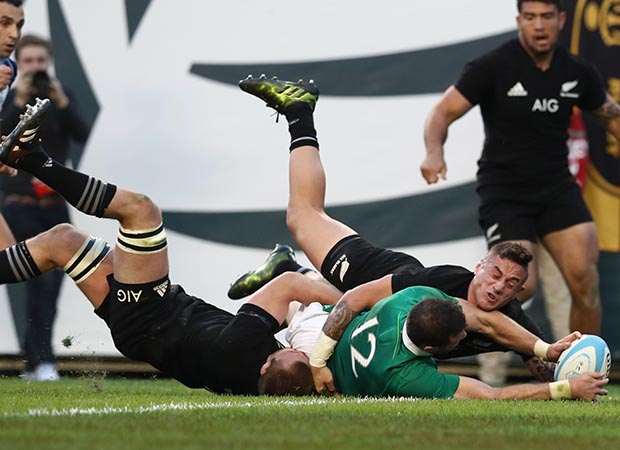 There was even talk of Joe Schmidt departing sooner rather than later and it now transpires that the NZRU had been in touch with the offer of a contract with a Super Rugby club. In retrospect Schmidt's decision, announced ahead of the game in Chicago, to stay and sign a new contract taking him up to RWC2019 was a massive, encouraging omen for the future, both the immediate and long term.
There was even talk of Joe Schmidt departing sooner rather than later and it now transpires that the NZRU had been in touch with the offer of a contract with a Super Rugby club. In retrospect Schmidt's decision, announced ahead of the game in Chicago, to stay and sign a new contract taking him up to RWC2019 was a massive, encouraging omen for the future, both the immediate and long term.
And without being wise after the event – no critic that I am aware of forecast an Ireland win – there were certainly a few encouraging signs in Chicago last week before the game. A big performance from Ireland was not unexpected, it was just the win and the manner of victory that rocked the rugby world.
Ireland, it seemed to me, were unusually confident and buoyant and ever the relaxed travellers felt very at home in Chicago with its many Irish connections. Nor were they fazed one jot by the many distractions, not least the Cubs' first World Series win in 108 years and the celebrations that followed which in itself suggested there was magic in the air.
The tragic death of Anthony Foley was also undeniably a factor. Among many things it had promoted a tightness and renewed dedication to the cause throughout Ireland. With that mindset and motivation great things can be achieved as Munster, reduced to 14 men in the first half in their European Cup game against Glasgow, demonstrated so memorably in their game the day after Foley's funeral.
The Irish were well-prepared and Schmidt, one of the modern game's supreme tactical brains, had enjoyed nearly five months to plot and plan for this one game while New Zealand and Steve Hansen had been head down, putting together their staggering winning run.
Above all else, Schmidt knew that Ireland had to get on the front foot and land a few blows, as they did two years ago in Dublin when they were only denied at the death. The days of sneaking a win against New Zealand with superior forward power and world-class goal kicking have pretty much gone. You must compile a score against New Zealand because you can guarantee they will score a minimum of 25-30 points.
You have to meet fire with fire, it's impossible to rope-a-dope a win over New Zealand and you have to maintain discipline. Ireland conceded just four penalties in Chicago, a remarkable statistic and the lowest penalty count I can find for a side playing New Zealand.
The significance is not the shots at goal Ireland denied New Zealand – the All Blacks don't currently have a world-class kicker – it is the possession, territory and ball-in-hand time that such steely discipline denies them.
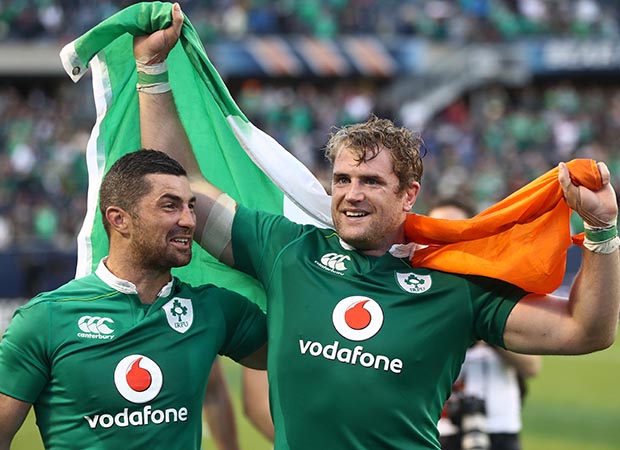 Like Japan famously did against South Africa in their World Cup victory at Brighton, Ireland also cut right down on the off-loads, which look great and can open defences but ups the risk of being turned over. Ireland off-loaded just three times in 80 minutes.
Like Japan famously did against South Africa in their World Cup victory at Brighton, Ireland also cut right down on the off-loads, which look great and can open defences but ups the risk of being turned over. Ireland off-loaded just three times in 80 minutes.
Schmidt knew Ireland had to be fearless, ball in hand, and produce precise passing and clever running angles off the back of a great setpiece while avoiding at all times the poor kicking and turnovers which bring New Zealand's devastating counter-attacking runners into play.
Meanwhile, quality kicking into the five-metre channels that isolates wings and puts them under pressure, was very much encouraged as well. Why wouldn't you when you have two of the great high ball exponents – Rob Kearney and Simon Zebo – in your lineup.
So, in short, if Warren Gatland is looking for a template for success next summer he need look no further than this game. Schmidt and Ireland have come up with the route map to success and Gatland must tap into the ‘knowledge'.
That was the theory and practice, the ultimate example of attack being the best form of defence. If you are busy compiling relentless multi-phase attacks and hitting New Zealand from all angles, the All Blacks, by definition, cannot be attacking themselves With Conor Murray – who never has a bad game against New Zealand – and Jonny Sexton in consummate form knitting all the threads of the gameplan together, Ireland roared their way through the first half to take a 25-8 lead. Never in the history of Test rugby have New Zealand been further behind at half-time and Zebo added a fourth try soon after the break to make it 30-8.
Of course, New Zealand – with replacement scrum-half TJ Perenara sparking up the fightback after inexplicably being overlooked for Aaron Smith – fought their way back into the game and it became tense for a while. Perhaps Ireland's greatest achievement, however, was to keep faith with their overall gameplan and to get back on the front foot and close out the game with a sumptuous set-piece try.
Job done. Memorably so.
BRENDAN GALLAGHER


